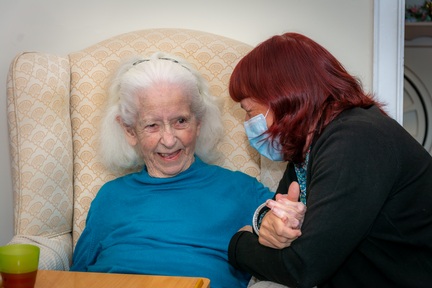£1.2m dementia care home programme aims to personalise care in a COVID-19 world
The government is funding a new programme to improve and personalise care for people with dementia in care homes, with the project addressing challenges such as residents being unable to see their families and staff wearing full PPE.

The funding from the National Institute for Health Research (NIHR) and UK Research and Innovation (UKRI) will be used to roll out an innovative online programme giving training and support to care staff.
A recent report from the London School of Economics and University College London showed people with dementia have accounted for a quarter of all COVID-related deaths in England and Wales, and three-quarters of all deaths in care facilities globally.
Many of the 400,000 people living in care homes in the UK have dementia, mental health or neuropsychiatric symptoms, and a number of physical illnesses, so they are at particularly high risk of developing severe COVID-19. Professor Dag Aarsland, chair of Old Age Psychiatry, Institute of Psychiatry, Psychology & Neuroscience at King’s College London, which is leading the programme with Exeter University, said: “The COVID-19 related social distancing has made it particularly challenging for care home residents with dementia.
“They might not be able to see their families and loved ones, and may see staff in full PPE gear, which might be frightening, without fully understanding the reasons behind these changes.”
Project will help families and care workers 'adapt to challenging times better'
He added: “This is expected to lead to increased emotional stress including anxiety, depression and night-time problems, which again will lead to poorer physical health and well-being for care home residents. This project will address these challenges and help to improve the quality of life for people living with dementia in care homes, helping families and carers adapt to these challenging times better.”
The research which is also funded by Torbay Council and the Schroder Foundation, and supported by Alzheimer’s Society will draw on the most successful elements of their Improving Wellbeing and Health for People with Dementia (WHELD) programme, one of the very few staff training programmes proven to improve lives for people with dementia in care homes.
Professor Clive Ballard, dean and pro-vice chancellor of the University of Exeter Medical School, said: “Care home residents are among the frailest in society, and are at particularly high risk of dying from COVID-19. I’m delighted that this funding will help us to adapt the programme to a COVID-19 world, and roll it out swiftly, to provide the best possible support to residents and staff.”
Clinical trials have shown WHELD improved quality of life and mental health, and reduced the use of harmful sedative drugs. The staff training programme will be adapted to the needs presented by the COVID-19 crisis, and a digital version of the programme will be provided to almost 1,500 care homes nationwide, with support provided virtually.
Sam Ebden, registered manager at Pendennis residential home in Paignton, South Devon, revealed that during the pandemic, one of the biggest challenges was the staff having to wear PPE and the impact this had on the residents.
She said: “The residents know that something’s amiss when relatives can no longer visit as they used to, and that’s certainly been unsettling for them. However the impact of the masks was more immediate, and they initially made it difficult for residents to recognise the staff team members. Many of the residents would still prefer us not to wear masks.
'We have had to be additionally attentive' to residents' 'emotional wellbeing'
“Naturally the residents with advanced dementia have not easily understood the challenges, and we have had to be additionally attentive to their emotional wellbeing. It has been an incredibly stressful time for care homes, having a strong team has helped us and has possibly ensured that we have remained COVID-19 free up to now.
“We’re really excited to sign up to WHELD, our aim is to always improve, and give the best possible care to our residents. I’m really interested in the personalised care aspect of the programme. That’s something we try to achieve here – we encourage families to share residents’ life histories and stories and we work hard to engage them in activities that are relevant to them.”
The platform aims to bring together conversations and resources to share stories and solutions to the challenges care homes face.
Professor Martin Knapp, NIHR's social care spokesperson and director of the NIHR School for Social Care Research, said: "Having staff who are skilled in offering person-centred care can make the world of difference to people living in care homes, as shown by the previous NIHR-funded research on the WHELD programme. I'm pleased our researchers are responding to the pandemic by adapting the programme for online delivery, as care homes are facing huge challenges in these difficult times."
Latest News
 29-Jul-24
Dementia Bus gives carehome.co.uk staff insight into life with dementia
29-Jul-24
Dementia Bus gives carehome.co.uk staff insight into life with dementia
 01-Mar-24
Find out the top care homes in 2024
01-Mar-24
Find out the top care homes in 2024
 21-Mar-23
UK's top care homes in 2023 revealed
21-Mar-23
UK's top care homes in 2023 revealed
 03-Jan-23
carehome.co.uk launches free care helpline
03-Jan-23
carehome.co.uk launches free care helpline
 13-Dec-22
5 mins with Emily Whitehurst, chief operating officer for Constantia Healthcare
13-Dec-22
5 mins with Emily Whitehurst, chief operating officer for Constantia Healthcare